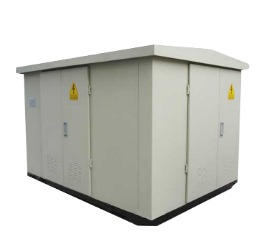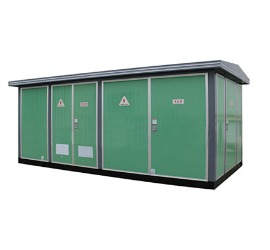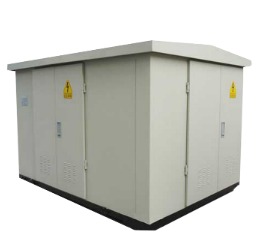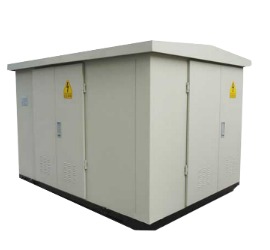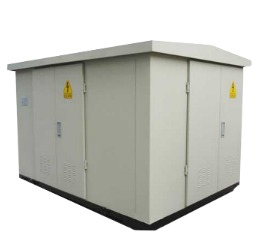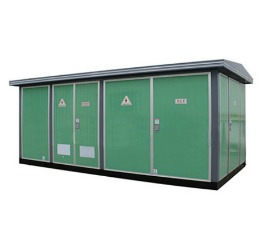
Prefabricated Compact Substation
The prefabricated compact substation is one kind of compact complete set of distribution equipment which designed combining medium voltage switchgear, low voltage switchgear, distribution transformer, energy metering devices and reactive power compensation devices into one or several boxes according to a certain wiring scheme. It is suitable for three-phase AC systems with a rated voltage of 11KV or 33KV for line and distribution of electrical energy.
With the advantage of compact size, prefabricated compact substation was widely used in the three phases of the power distribution system with the voltage rating from 11kV to 33kV for electricity distributing. The protection degree reached IP55, so it could be installed outdoor by occupying the small area.
Prefabricated compact substations are suitable for residential quarters, urban public utilities and construction power supplies etc., users can select compact transformers according to different conditions of use and load levels.
Normally our customers adopt an oil filled transformer in the prefabricated compact substation if there is no special requirement because of the cheaper price than dry type transformer. The capacity of the distribution transformer is in the range of 100KVA to 1250KVA, maximum not exceeding1600KVA.
The prefabricated compact substation shell part adopts the current domestic leading technology and technology, the shell generally adopts the galvanized steel plate, the frame uses the standard container material and the production craft, has the good antiseptic performance, guarantees 20 years no rust. Equipment operation is not affected by natural climatic environment and external pollution, and it can ensure normal operation in harsh environments from -40°C to +40°C.
Prefabricated compact substation adopts the advanced designing idea, so the appearance is beautiful and the size was optimized to be 1/10 of the same capacity power substation.
Applications For Prefabricated Compact Substation

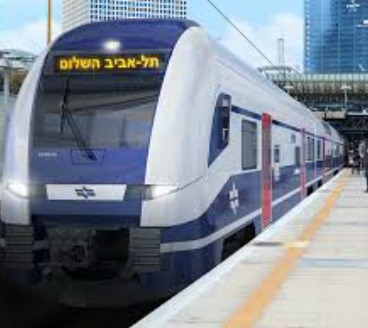


Prefabricated Compact Substation Basics: The Definitive Guide
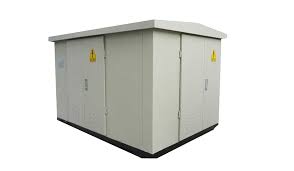
Prefabricated compact substation.
Have you ever encountered this term?
If you’re in the industrial sector, perhaps you’ve heard it several times.
But what is it really and how does it work?
What are the different components of this?
Perhaps these are the questions which are popping to your mind right now.
Luckily, in this e-book about the definitive guide to the prefabricated compact substation, we will provide you with everything you need to know about this term.
Are you now ready?
Chapter 1: Compact Substation Definition: What is a Compact Substation?
A prefabricated compact substation is a substation at the end of the medium-voltage distribution network.
They are manufactured and assembled in the factory in advance including:
- transformers,
- high-voltage switchgear and control equipment,
- low-voltage switchgear and control equipment,
- internal wiring (cable, bus, etc.),
- measurement,
- compensation,
- lightning arrester and;
- other auxiliary equipment, configured in common
You see:
A complete compact substation specification is referred to as prefabricated substation.
It’s also known as “package unit substation” and “mini substation.”
It is within a housing or a group of enclosures that have passed type tests according to corresponding standards.
This prefabricated substation does not need the on-site installation program of electrical equipment.
Instead, they can be initiated after being transported directly to the place.
Thus, it makes it quick and convenient to deploy.
What Does Compact Substation Mean?
The prefabricated compact substation is also called as “packaged transformer substation“.
It is a type of distribution device that separates both the:
- wiring scheme of the power supply and;
- transformation project
into the specific functional interval.
It assembles the high or low voltage electrical equipment in corresponding functional interval into complete substation function in the factory.
It is also installed on the outdoors and has a metal or concrete structure.
Compact Substation Function
The function of the prefabricated compact substation is transfer high voltage to be low voltage, for example, The 11kV high voltage changed to be 380V working voltage through the transformer inside of the substation.
According to a specific wiring system, the factory prefabricated indoor and outdoor compact distribution equipment are progressively combined and installed in a:
- moisture-proof,
- rust-proof,
- dust-proof,
- rat-proof,
- fire-proof,
- anti-theft room
The electric compact substation is movable, fully enclosed and heat-insulated substation.

Prefabricated compact substation in public
They are appropriate for urban network construction and transformation.
A packaged electrical substation is a new substation after the growth of civil substations.
The prefabricated substation is suitable for:
- mines,
- factories,
- oil and gas fields and;
- wind power stations.
It transforms the original power distribution room and distribution station.
Then it becomes a new set of power distribution equipment.
What is Compact Substation in Power System?
A mini substation is a compact distribution device which combines:
- high voltage switchgear,
- distribution transformer,
- low voltage switchgear,
- electric energy metering equipment,
- the reactive power compensation device
in one or several mini substations according to an individual connection scheme.
It is appropriate for three-phase AC system with rated voltage 11/0.4KV.
These are utilized for line and distribution of electric energy.
Various Types of Compact Substation
According to the appearance and shell material, the transformer substation can be divided into:
1. Wooden Strip Type Compact Substation
Wooden strip type transformer substation features a robust anti-sun performance.

Wooden strip type compact substation
This type is not simple to heat condition, and it has the ability to lessen the running temperature of your internal equipment.
One good thing about this prefabricated substation is that it offers:
- frost resistance,
- corrosion resistance,
- no rust,
- no need for maintenance and;
- long service life.
It has a good moisture-proof property and will not produce condensation due to cold and hot changes.
2. Stone Type Prefabricated Compact Substation
A stone type of package substation has excellent flame retardancy and excellent fire resistance.

Stone type prefabricated compact substation
The shape and color can be designated according to the surrounding environment.
Apart from its physical compact substation advantages, it can also beautify the environment.
3. Ordinary Iron Case Compact Substation
This type of compact substation offers:
- good flame retardancy and;
- good fire resistance.

Iron type compact substation
It has excellent mechanical properties as well as impact resistance.
Chapter 2: Compact Substation Design: The Compact Substation Structure
The overall structure of compact substation design can be divided into three parts:
- high voltage switchgear,
- transformer;
- low voltage distribution device.
Sulfur hexafluoride or vacuum circuit breaker, ring network switch, load switch and fuse can be designated for high voltage switch according to system requirements.
The metering device can also be installed on the high-pressure side.
The low-voltage side is usually equipped with the main switch and shunt feeder switch.
Meanwhile, some are equipped with only a feeder switch.
Feed directly to low-voltage terminal users.
Compensation capacitors and metering devices can also be installed.
Distribution transformers usually use oil immersed or dry type transformers.
How to Design a Compact Substation?
The prefabricated substation is considered a low-voltage, transformer, and high-voltage switchgear distribution device.
It is a factory prefabricated outdoor and indoor compact distribution equipment.
That means, the low-voltage distribution, transformer voltage reduction, high-voltage power, and other functions are combined organically.
The body of the substation is composed of three (3) different parts:
- the base
- the top cover
- the shell
Let’s discuss each of them.
The base is made of steel plate, angle steel, flat steel, channel steel and more.
They are bolted and welded together to build.
If you want to meet the requirements of ventilation, the following must be opened at corresponding lines.
- circular holes of the moderate size
- strip holes
- outlet and inlet lines
- heat dissipation
- ventilation
On the other hand, the top cover channel steel and outer shell of the box are bent, welded and attached along with hinges, screws and other special accessories.
According to standard requirements, the material of the box shell should have:
- small animals
- rust
- dust
- rain
- sunscreen
into five anti-entry functions.
In the conventional packaged substation having a unified design, the insulation filler is geared in the shell.
The method isn’t longer utilized by the majority of designers though.
That’s because the insulation filler can stop intense sunlight radiation within the hot summer.
Apart from that, it can also obstruct the operation of the mini substation to generate a significant amount of heat dissipation.
There’s more you need to know aside from retaining the method of punching the blinds on the shell.
The majority of compact substation designers adopt the technique of extending the heat dissipation region.
It will also improve air convection to dissipate heat while lowering the manufacturing expenses.
The primary equipment in the substation design adopts the top domestic technology equipment like:
- vacuum circuit breaker
- dry transformer
- vacuum switchgear
The intelligent design of the prefabricated substation like the production system adopts the microcomputer integrated device of the mini substation.
Every unit has an individual operation function.
They also transport protection function is accomplished.
The operation parameters could be set separately, and the temperature and humidity in the substation structure can be controlled.
In the HV substation design, if the designer creates the main wiring diagram, he can select the substation presented by the manufacturer to transform the models and specifications.
Lastly, due to the compact structure of the prefabricated compact substation, every substation creates an independent system.
That makes it changeable and flexible.
Compact Substation Structure
High-Voltage Distribution Compartment
A European prefabricated compact substation high-voltage distribution device can be divided into:
- terminal type;
- ring network type
from the way of the feeding line.
It can be distributed into:
- overhead feeding line from the top of the box (more traditional box using this method) and;
- the use of high-voltage cable trench from the underground line.
It is a typical method in modern design.
SF6 series load switches with SF6 gas as an arc quenching medium have more cost than FN-10 series high voltage load switches.
You see:
This type of switch structure, with a fuse, no fuse, ground switch, etc.,
But it is generally equipped with the live display;
Furthermore, the operating mechanism is typically manual, but also electric operation.
With a fuse, when a short circuit fault occurs in the circuit:
- it can cut off the switch,
- protect the circuit and transformer, switch and other equipment.
There are also vacuum switches with vacuum as arc extinguishing medium.
They can be utilized alone or with fuses and can be used in series with the SF6 series load switches.
However, this will increase the cost, if the user does not have special requirements do not need to use such switches.
Low-Voltage Distribution Compartment
Apart from high-voltage distribution, the low-voltage pressure chamber of the European-type compact substation must be different in:
- structure and;
- design
That’s according to various usage scenarios of mining and industrials enterprises or even residential quarters.
To make things simple:
The lighting supply and the power supply must be designed individually for those European-style prefabricated compact substations.
Typically, there are mostly utilized by mining and industrial sectors.
When using low-voltage metering, the Power Supply Bureau obliges individual metering of lighting power.
Why?
That’s because the unit cost of the lighting power is higher compared to power.
Further, the structural transmission substation design employed in the residential sectors, you don’t need to consider the issue of power consumption.
Amazing, isn’t it?
Distribution Transformer Compartment
Did you know that prefabricated compact substation are geared with independent transformer room?
The transformer room includes:
- safety and lighting barrier,
- automatic temperature control system and;
Basically, when a medium voltage substation is running, a massive deal of heat is produced in the transformer chamber.
Thus, the ventilation and heat dissipation on the chamber must be considered on how to design a substation.
During high temperatures, more temperatures are increasing faster.
That denotes that only heat dissipation and natural ventilation cannot guarantee the safe and reliable operation of the mini substation.
The small capacity of the compact substation through temperature measurement protection and natural ventilation is designed as well.
Moreover, forced ventilation measures are also employed to fix it
What is RMU in Compact Substation?

Rmu in compact substation
Ring main unit for the outdoor compact substation was designed with the advantages of the uninterrupted power supply.
You see:
The question of what is rmu in a substation can be answered easily.
The function of RMU is to make sure that when the primary source of power supply shutdowns, another source could be feed as soon as possible.
Ring main units are insulated, which is one of the best and safest kinds of RMU in the market.
As an alternative, it can be presented as extendable rmu.
It can be referred to as an extendable compact ring main unit.
Compact Substation Dimension (Size)
European, American and integrated transformer substation have their advantages and disadvantages.
European mini substations have:
- larger volume,
- high and low voltage switches;
- transformers are located in a large shell, poor heat dissipation conditions,
- they need to install a mechanical exhaust device.
Due to the direct external heat dissipation of the transformer cooling sheet, the cooling condition of the American-style prefabricated compact substation is relatively good.
However, its shape is worse than that of the European-style 11kv substation design.
The outdoor compact substation is less occupied.
The good thing here is that:
The advantages and disadvantages are the same as those of the American compact substation.
Also, the U. S. and universal compact substation can only be manufactured in China below 630 kVA capacity.
Meanwhile, the European substation can be up to 1250 kVA.
The capacity of the mini substation is in the range of 100 kVA up to 1250 kVA, maximum and not exceeding 16000 kVA.
A transformer substation adopts the state-of-the-art substation equipment layout idea.
Therefore, the look is impressive and the compact substation size was optimized to be 1/10 of the same capacity power substation.
Chapter 3: Compact Substation Components and Equipment List
Are you now wondering what the components of the prefabricated substation are?
Well, in this Chapter we will discuss with you EVERYTHING.
What is a Feeder in Compact Substation?
What is a feeder in prefabricated compact substation?
Did you know?
The feeder was formerly called as high-voltage switchgear.
It has receiving switchgear and feeder switchgear, high-voltage switchgear.
Now it’s called receiving switchgear for the incoming switchgear and called feeder switchgear for the outgoing switchgear.
It is a type of outlet situation of the high voltage switchgear.
That means that the high voltage outlet is direct to the transformer.
Compact Substation Components and Equipment List
In the last Chapter, you already know that the compact substations have three compartments:
- High voltage distribution compartment
- Low voltage distribution compartment
- Transformer distribution compartment
To fully understand the substation components, read further the list of substation equipment list we prepared for you.

Prefabricated compact substation compartments
High Voltage Distribution Component Parts
The significant components of the high voltage distribution parts include:
- High voltage grounding switch
- High voltage fuse
- High voltage load switch
- High voltage arrester
- Electromagnetic lock
- Live Display
Let’s take a look at each of them.
1. Live Display
The live display device is composed of:
- a voltage sensor and;
- a display.
The two parts are connected by the installation to form a voltage display device.
It is used to reflect the power supply or no electricity of the high voltage circuit in the display device.
2. Electromagnetic Lock
The indoor electromagnetic lock is an electronic control mechanism interlocking device.
This component can prevent misoperation of high voltage switchgear.
It is also used in front and back switchgear doors of indoor high voltage switchgear.
It serves to prevent misoperation.
Apart from that, it is an indispensable locking device for power generation and power supply departments.
3. High Voltage Switch
The function of the high voltage switch is to:
- turn on and off the rated voltage and current circuit,
- cause visible air interval,
- can’t cut off short-circuit current, and high-voltage fuse in series use.
4. High Voltage Fuse
High voltage fuse is also known as high voltage current limiting fuse for transformer protection.
Because the high voltage load switch can only cut off the load current, when encountering short circuit and overload, the current becomes larger, and the load switch is loaded.
You see:
It is impossible to cut off the current at this time, and the large current will be cut off by the fuse.
5. High Voltage Grounding Switch
The grounding device works to ensure personal safety during overhaul.
The indoor high voltage grounding switch is the main component of the 12kV indoor AC metal armored prefabricated compact substation and other high voltage compact substation.
6. Lighting Arrester
The function of lighting arrester is to limit overvoltage to protect electrical equipment of AC power system from atmospheric overvoltage and operating overvoltage damage.
7. Low Voltage Distribution Component Parts
As a reminder for you, low voltage distribution works to:
- reduce reactive power (mostly inductive load in the grid),
- improve power factor,
- ensure the full utilization of active power,
- improve the efficiency of the power supply and voltage quality of the system,
- reduce line losses,
- reduce the cost of distribution lines and;
- save electricity to limit overvoltage
Following are the components of the low voltage compact substation:
1. Lightning Arrester
The lighting arresters function to limit overvoltage to protect electrical equipment of an AC power system from atmospheric overvoltage and operating overvoltage damage.
2. Capacitor
This is utilized to compensate the inductive current in the power grid.
It’s also utilized to:
- reduce line losses,
- improve line transmission capacity, and;
- boost the power factor of the power grid.
3. Switched Capacitor Contractor
These substation components can be used for:
- switching on or;
- removing low voltage shunt capacitors for low voltage reactive power compensation equipment in improving power factor.
Did you know?
Contactor with inrush suppression device can effectively reduce the impact of inrush current on the capacitor.
It can also restrain the overvoltage during the interruption.
4. Current Transformer
The large current is changed into the small current in proportion.
That is used for current, electric energy measurement and relay protection.
5. Load Isolating Switch
The isolating switch is inaccessible from the incoming switchgear in the front.
The same is true, but the selection of rated current is different
6. Transformer Distribution Component Parts
With transformer distribution, the prefabricated substation can be installed along with different kinds of the oil filled transformer.
What’s more:
It can also be installed along with cast resin dry type transformer.
Its distribution substation components include:
- Low-pressure compensation switchgear
- Low voltage outlet switchgear and;
- Low voltage inlet switchgear
Chapter 4: The Function of Compact Substation: How Does A Compact Substation Work?
After knowing the different substation transformer parts and distribution substation components, what’s next?
In this Chapter, you will learn what the purpose of a substation is and how a substation works.
What’s the Function of a Compact Substation?
A compact substation is suitable for:
- distribution lines,
- residential districts,
- streets,
- large construction sites,
- high-rise buildings,
- parks,
- shopping malls,
- schools,
- industrial and mining enterprises and;
- temporary facilities on both sides of the road in the urban network.
This prefabricated compact substation has the advantages of:
- low investment,
- small area,
- short construction period,
- convenient maintenance,
- safety and reliability, especially the diversification of its shape and surrounding.
The environment has been coordinated and has been vigorously developed.
How Does a Compact Substation Work?
The prefabricated compact substation is a compact distribution device that combines
- high voltage switchgear distribution transformer,
- low voltage switchgear,
- electric energy metering equipment and;
- the reactive power compensation device
in one or several boxes according to a particular connection scheme.
It is appropriate for a three-phase AC system with rated voltage 11/0.4KV.
These mini substations are utilized for line and distribution of electric energy.
Mainly they are composed of:
- the multi-loop high-voltage switching system,
- armored busbar,
They are installed in a moisture-proof, rust-proof, dust-proof, rat-proof, fire-proof, burglar-proof, heat-proof, fully blocked, movable steel box fully blocked operation.
The packaged substation shell is made of steel plate or alloy plate.
They are geared with double top cover and good heat insulation.
What’s more:
The shell and skeleton are all sheltered by antisepsis.
They have long time outdoor premises (complete sets of equipment) too.
On the other hand, the shape and color can be synchronized with the environment at one time.
It is simple to install.
A cable room is organized under the foundation of a European type compact substation.
A manhole is also prepared in the low-voltage room to enter the cable room for work.
From the perspective of volume, the compact transformer is fortified with:
- conventional switchgear and;
- transformers and the products are large.
Meanwhile, the American type transformer is smaller because of the single body installation (electric meter box).
The load side switch and the current limiting fuse are utilized to keep the high voltage side of the transformer.
When a phase-1 fuse is formed, the load switch 3 is switched on at the same time with the fuse pin collision to prevent the phase-out operation.
The load switch is demanded to cut the transfer current.
The low voltage side is preserved by load switch plus current limiting fuse.
The high voltage side of American type compact substation is upheld by a fuse.
While the load switch is only utilized for switching and cutting off the high voltage load current.
When the high-voltage side grants a phase fuse, the voltage on the low-voltage side will drop.
The plastic case automatic air switch under-voltage maintenance or overcurrent maintenance will operate.
Thus, the low-voltage operation will not occur.
Chapter 5: Compact Substation Testing and Installation
Some components on prefabricated substation should be inspected and maintained regularly.
It includes:
- ring main unit,
- transformer,
- lightning arrester;
- other equipment in high voltage distribution device.
The defects should be found and repaired in time.
The preventive insulation test should be carried out regularly.
The packaged substation will be postponed for more than three months, and all preventive tests should be carried out before commissioning.
The transformer must be cut off if you want to replace the high-voltage fuse without interrupting ability,
The mechanical interlock should be removed correctly during operation.
Also, the insulated operating rod should be used.
All incoming and outgoing cable holes in packaged substation should be blocked.
Doing this will prevent small animals from entering and cause accidents.
The floor of a prefabricated compact substation should be selected at a higher level.
That’s an alternative to not choosing a lower level.
Doing this will avoid rainwater pouring into the substation affecting the operation of the equipment.
When the concrete platform is poured, there should be a gap between the:
- high voltage side
- low voltage side
That will facilitate the laying of the cable inlet and outlet.
When excavating the foundation, if it encounters the ground accumulated by garbage or rotten soil, it is necessary to dig up the solid soil.
Then fill the better soil and compact it, and then fill the composite soil or road slag to ensure the stability of the foundation.
Testing of Prefabricated Compact Substation

Compact substation testing
Before docking and unloading the vessel in which the equipment is located,
- the service technician of the manufacturer,
- the personnel of the logistics center and;
- the material department
must inspect the equipment one by one.
They must promptly raise the problems.
Collecting the pictures and data and make relevant written records should also be observed.
Even signing and confirming when recording is necessary, too.
Before hoisting equipment, it is necessary to carry out a safety inspection on
- hoisting equipment (gantry crane, crane, etc.) and;
- tools (sling, wire rope, equipment steel frame structure)
It’s also crucial to check the operation of hoisting equipment.
All of which is normal before hoisting can be carried out.
Equipment hoisting should be strictly carried out according to the standard of construction technology for large equipment hoisting engineering.

Compact substation Hoisting for installation
Are you now done transporting your compact substation by sea or land to the construction site?
If so, the service technician of the manufacturer, the personnel of the logistics center and the material department shall check whether the change is damaged or destroyed in the course of land transportation.
When complications are found, they should be promptly put forward and photographic data collected and relevant written records made.
When recording, the personnel of all parties should sign and confirm.
Then the equipment should be recorded without damage.
The crane driver should recognize the stopping position of the crane and the loader.
The position will be based according to the changing installation position of the substation and the site conditions.
Doing this will ensure that the
- lifting position;
- the installation position of the equipment
are within the scope of the crane construction operation.
Nonetheless, what if the installation position of the compact substation is far from the road?
What if the crane can’t meet the installation requirements of the substation on the road?
If that’s the case, the unique construction scheme of the compact substation in the six districts and eight districts ought to be referred to.
Compact Substation Installation Guide
1. Cable Laying & Connection of Low and High Voltage Cables
After the transformer substation is installed in the correct position, the high and low voltage cables should be excavated.
The mega-ohm meter must be employed to determine whether the insulation grade of the cables is qualified or not.
Further, the cables with unqualified insulation grade should be strictly forbidden to carry out follow-up construction.

Compact substation installation
After the insulation test is qualified, the personnel can arrange high and low voltage cables.
These cables will be laid in the transformer.
You see:
The high and low voltage cable head is made by the electric technician.
Before the cable head is made, it should be checked whether the cable circuit is consistent with:
- the design circuit of the unit building and
- the box transformer.
After the cable head is complete, the substation should change the base port to seal up.
That’s the time where the cable sign will be installed.
2. Grounding Device Installation
After the compact substation is installed, you can install the grounding device.
Bear in mind that the type and quantity of grounding electrode and grounding trunk line should meet the requirements of design drawings.
The following areas should meet the specifications and design requirements:
- grounding depth,
- grounding device connection and;
- grounding resistance value
3. Safety Plan for Equipment Installation
Whenever installing huge equipment like a prefabricated substation, it’s important to be as safe as possible.
Following are the safety rules you need to consider when installing the compact substation:
- Personnel entering the construction should wear safety helmets.
- The special person must direct the entire process of crane hoisting.
The driver of the crane should not obey others’ command.
However, the emergency stop signal should be implemented immediately.
- When crane hoisting operations, all personnel should pay attention to:
- safety,
- crane operating radius is strictly prohibited from standing.
- Construction work should not be lifted on condition of grade five gale or heavy rain.
- In the construction work area, it is strictly prohibited for the relevant personnel to chase and make trouble.
What’s more:
The unrelated personnel shall not enter the construction work area. - Crane drivers must operate according to crane operating rules.
Chapter 6: Compact Substation Fault and Maintenance
A compact substation is known as a:
- double-layered,
- movable,
- anti-corrosion outdoor transformer.
As discussed in the previous Chapters, it is composed of high and low voltage equipment, and transformer incorporated inside the factory.
The complete name of this type of transformer is prefabricated compact substation.
It’s a type of power equipment that can be hoisted and transported by combining power with low and high voltage distribution in one or various switchgears.
The compact substation is widely utilized in the construction of the railway, urban power grid, and railway.
That’s thanks to its neat look, compact structure, simple movement and installation and more.
Compact Substation Fault Meaning
Did you know that the packaged substation’s relay protection system can safeguard transformer components?

Compact substation fault
Yes, you read that right.
Every time the power system happens or presents an abnormal working state, it can cut off the fault-free equipment automatically, selectively and quickly.
Isn’t that amazing?
That process will guarantee the normal and flawless operation of the equipment.
It will also limit the incident to the minimum range.
Therefore, it will offer the stability of the power system.
Ultimately, it will guarantee the security of electricity consumption.
Types of Fault in Compact Substation
1. The frame circuit breaker cannot be closed.
Some of the cause of this fault in compact substation includes:
- control circuit failure
- energy storage doesn’t store enough energy
- after the intelligent release, the red button on the panel isn’t reset
To fix your problem, you can check the opening point with a multimeter.
Make sure that you also find out the cause of the trip and press the reset button after troubleshooting.
Don’t forget to check the manual or electric energy storage as well.
2. The molded case circuit breaker cannot be closed.
The apparent cause for this substation fault might be the insufficient release after tripping.
It might also be that the circuit breaker is with under voltage coil.
Thus, it doesn’t have the power supply at the incoming end.
To solve these types of faults in the substation, you need to identify the cause of tripping and reset after troubleshooting.
If you observe the electrification of incoming line, you can reset the handle and then close.
3. Switch on the circuit breaker
The only cause for this is there’s a short circuit in the outlet loop.
The solution to this is not to switch on repeatedly. You need to determine the substation fault.
Then you can get rid of them before closing.
4. Capacitor switchgear cannot automatically compensate.
If your capacitor switchgear can’t compensate automatically, it might be because the power supply of the control loop is not there.
It might also be because the existing signal line isn’t connected appropriately.
Do you think what the solution to this?
Well, it’s straightforward.
You can check the control loop and restore the power supply.
Alternatively, you can also connect the signal line correctly.
Compact Substation Maintenance Schedule

Compact Substation Maintenance
When is the perfect time to conduct a maintenance schedule for your compact substation?
Well, in case you didn’t know yet, your compact substation must be maintained on a regular basis.
It should not be less than a month.
That time frame is according to the inspection and maintenance cycle.
You also need to bear in mind that temperature at the junction of the cable terminal should be tested.
The operation of the equipment should also be checked as well.
The face test is performed if needed.
Compact Substation Maintenance Procedures

High voltage switchgear maintenance
Following are the general items you need to check if you’re carrying out your maintenance inspection:
- Is the foundation firmly trapped?
Ask yourself whether the hole is blocked and whether there is moisture in the switchgear. - Whether the grounding device is complete and the connection is good.
Does the grounding resistance meet the requirements? - Is there any change in the outdoor environment?
Does it affect the safety of traffic and pedestrians? - Check the load of each feeder line.
Whether the three-phase load is balanced or overloaded, - whether the switch splitting position,
- the instrument indication is correct, or;
- whether the control device is working properly.
Conclusion
Prefabricated compact substation has transformed over the past 20 years.
It evolved to such a level which they can almost be sought as a standard product line.
What was once a phase deemed as the hugely complicated task has now become standard practice by different compact substation manufacturers.
Compact substations that comply completely along with the standard specification of IEC have transformed into an acceptable option to traditional substations.
That’s because they deliver the needed:
- functionality,
- operational safety and;
These days, there are ever increasing prices of performing site work.
That’s particularly true in remote locations.
Therefore, this alternative is likely to become more frequently referred by the majority of end users.
Now, are questions been answered about:
- what is compact substation?
- what does substation mean?
- how does a substation work?
- what are the substation components and their functions?
- how to perform substation equipment maintenance?
We hope all of this is now clear to you!
Do you have more suggestions or queries you want to ask?
Share your thoughts with us!

